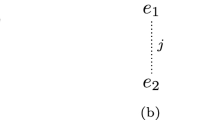Abstract
The objective of this paper is to identify a class of epistemic logic theories with group knowledge operators which have the fundamental property of being characterized by a finite number of finite models (up to equivalence). We specifically focus on S5-theories. We call this class of epistemic logic theories as finitary S5 -theories. Models of finitary S5-theories can be shown to be canonical in that they do not contain two worlds with the same interpretation. When the theory is pure, these models are minimal and differ from each other only in the actual world. The paper presents an algorithm for computing all models of a finitary S5-theory. Finitary S5-theories find applications in several contexts—in particular, the paper discusses their use in epistemic multi-agent planning.
Access this chapter
Tax calculation will be finalised at checkout
Purchases are for personal use only
Preview
Unable to display preview. Download preview PDF.
Similar content being viewed by others
References
Baltag, A., Moss, L.: Logics for epistemic programs. Synthese (2004)
van Benthem, J.: Modal Logic for Open Minds. Center for the Study of Language and Information (2010)
van Benthem, J., van Eijck, J., Kooi, B.P.: Logics of communication and change. Inf. Comput. 204(11), 1620–1662 (2006)
Blackburn, P., Van Benthem, J., Wolter, F. (eds.): Handbook of Modal Logic. Elsevier (2007)
Bolander, T., Andersen, M.: Epistemic Planning for Single and Multi-Agent Systems. Journal of Applied Non-Classical Logics 21(1) (2011)
van Ditmarsch, H., van der Hoek, W., Kooi, B.: Dynamic Epistemic Logic. Springer (2007)
Fagin, R., Halpern, J., Moses, Y., Vardi, M.: Reasoning about Knowledge. MIT Press (1995)
Gabbay, D., Kurucz, A., Wolter, F., Zakharyaschev, M.: Many-Dimensional Modal Logics: Theory and Application. Elsevier (2003)
Halpern, J.Y., Lakemeyer, G.: Multi-agent only knowing. In: Shoham, Y. (ed.) Proceedings of the Sixth Conference on Theoretical Aspects of Rationality and Knowledge, De Zeeuwse Stromen, The Netherlands, pp. 251–265. Morgan Kaufmann (1996)
Halpern, J., Moses, Y.: A guide to completeness and complexity for modal logics of knowledge and belief. Artificial Intelligence 54, 319–379 (1992)
Herzig, A., Lang, J., Marquis, P.: Action Progression and Revision in Multiagent Belief Structures. In: Sixth Workshop on Nonmonotonic Reasoning, Action, and Change, NRAC (2005)
van der Hoek, W., Wooldridge, M.: Tractable multiagent planning for epistemic goals. In: Proceedings of The First International Joint Conference on Autonomous Agents & Multiagent Systems, AAMAS 2002, Bologna, Italy, pp. 1167–1174. ACM (2002)
Lakemeyer, G., Levesque, H.J.: Only-knowing meets nonmonotonic modal logic. In: Brewka, G., Eiter, T., McIlraith, S.A. (eds.) Principles of Knowledge Representation and Reasoning: Proceedings of the Thirteenth International Conference, KR 2012, Rome, Italy, June 10-14. AAAI Press (2012)
Löwe, B., Pacuit, E., Witzel, A.: DEL planning and some tractable cases. In: van Ditmarsch, H., Lang, J., Ju, S. (eds.) LORI 2011. LNCS, vol. 6953, pp. 179–192. Springer, Heidelberg (2011)
Nguyen, L.A.: Constructing the least models for positive modal logic programs. Fundam. Inform. 42(1), 29–60 (2000)
Nguyen, L.A.: Constructing finite least kripke models for positive logic programs in serial regular grammar logics. Logic Journal of the IGPL 16(2), 175–193 (2008)
Author information
Authors and Affiliations
Editor information
Editors and Affiliations
Rights and permissions
Copyright information
© 2014 Springer International Publishing Switzerland
About this paper
Cite this paper
Son, T.C., Pontelli, E., Baral, C., Gelfond, G. (2014). Finitary S5-Theories. In: Fermé, E., Leite, J. (eds) Logics in Artificial Intelligence. JELIA 2014. Lecture Notes in Computer Science(), vol 8761. Springer, Cham. https://doi.org/10.1007/978-3-319-11558-0_17
Download citation
DOI: https://doi.org/10.1007/978-3-319-11558-0_17
Publisher Name: Springer, Cham
Print ISBN: 978-3-319-11557-3
Online ISBN: 978-3-319-11558-0
eBook Packages: Computer ScienceComputer Science (R0)




